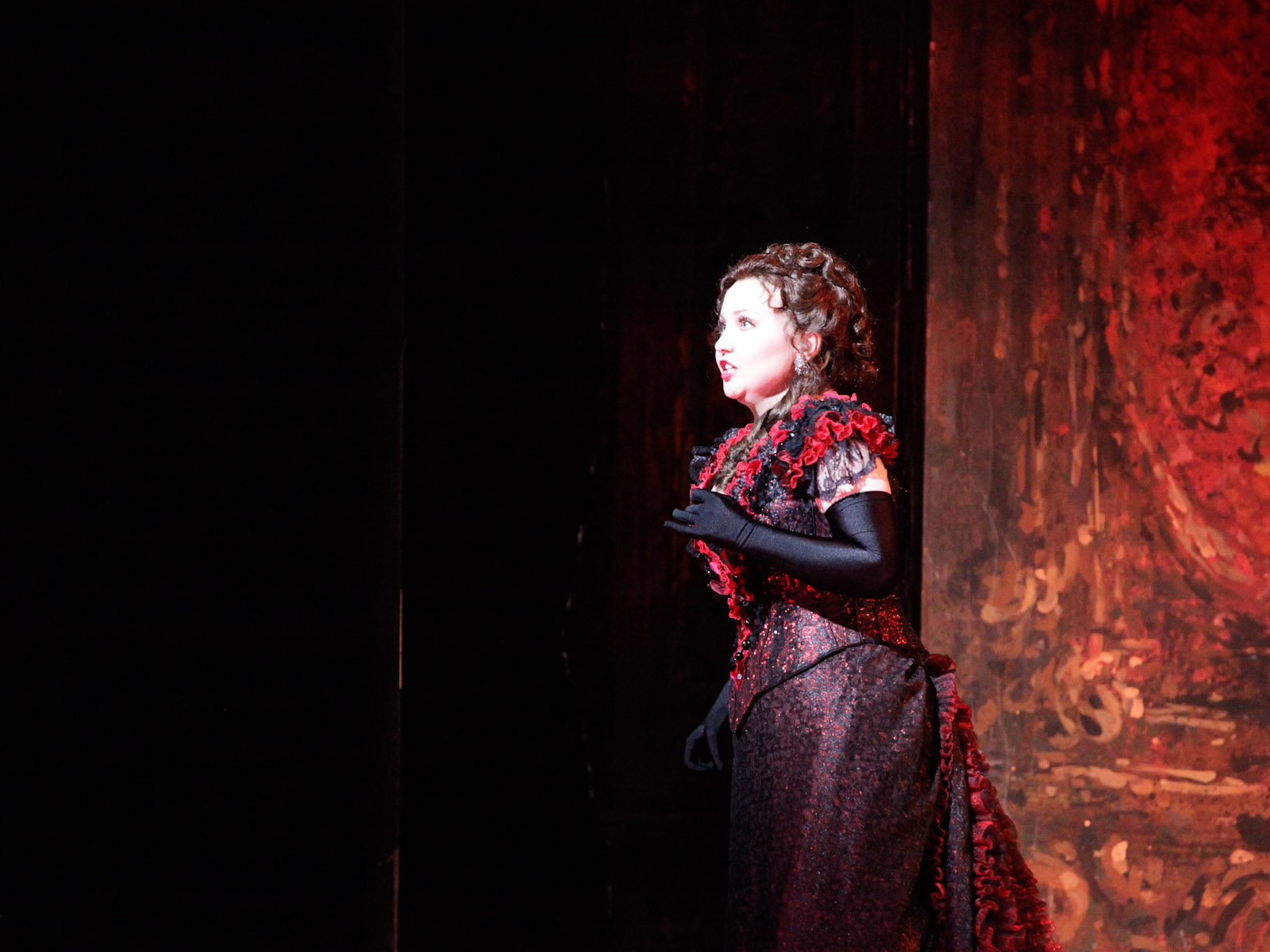No Free Love
Opera's greatest fallen women: HGO's La Traviata enjoys its place among thewicked seductresses
 Albina Shagimuratova as Violetta and Bryan Hymel as Alfredo in Houston GrandOpera's production of TraviataPhoto by Felix Sanchez
Albina Shagimuratova as Violetta and Bryan Hymel as Alfredo in Houston GrandOpera's production of TraviataPhoto by Felix Sanchez A scene from Houston Grand Opera's production of Traviata, with AlbinaShagimuratova as ViolettaPhoto by Felix Sanchez
A scene from Houston Grand Opera's production of Traviata, with AlbinaShagimuratova as ViolettaPhoto by Felix Sanchez
Falling in love or just plain fallen?
Many argue about the true subject of opera. Is it love, sex, death, nation, history, or the grandeur of music itself? Love is a popular answer. But as Houston Grand Opera kicks off Giuseppe Verdi's La Traviata Friday night at the Wortham Center, we realize something. Love comes with a price.
Fallen women abound in the canon of opera, from the greatest hits to the lesser-known works and from unlucky ingénues to committed courtesans.
La Traviata means quite literally "the fallen woman" and that woman is Violetta Valéry, a courtesan and creature of the Parisian salon scene who falls in love with the pure-hearted Alfredo Germont. At first Alfredo must vie for the affections of Violetta with her lover, the Baron Douphol. All is not well, at first, and then all is well. Violetta and Alfredo leave Paris for bucolic country life.
This being tragic opera, all is not well again quite soon, as financial difficulty, meddling families, tarnished reputations, erotic rivals, and tuberculosis seal the lovers's fates. In the end, Violetta is revealed to be the hooker with the heart of gold, the lovers are reunited briefly, Violetta dies in Alfredo's arms, revives briefly to sing a final farewell, and dies again.
That's right: Verdi's opera is so tragic, one death alone is not good enough for Violetta Valéry.
Houston audiences can look forward to a stellar cast lead by the marvelous Albina Shagimuratova, renowned for her Queen of the Night and triumphant in HGO's Lucia de Lammermoor just last season.
Tenor David Lomelí will miss the first few performances due to illness, as HGO announced several days ago. In his place, New Orleans native Bryan Hymel will make his Wortham debut having made his debut in Milan at the Teatro alla Scala as Don José in Carmen. La Traviata will be directed by Daniel Slater, director of HGO's 2009 Lohengrin, and conducted by artistic and music director Patrick Summers.
There are many ways to prepare for an opera, even a frequent favorite such as La Traviata. I suggest a little tour of opera's notable fallen women to prepare for the opening.
Here are a few fallen favorites:
Georges Bizet's Carmen may not feature a courtesan, but the fiery (and often busty) Carmen manages to seduce a soldier who then turns smuggler but abandons him for a bullfighter, which gets her killed in the end by her spurned ex-lover.
Here's Anna Caterina Antonacci performing the iconic Habanera for the Royal Opera House. The song is known for the line "Love is a rebellious bird that no one can tame."
Abbé Prévost's 1731 novel L’histoire du chevalier des Grieux et de Manon Lescaut inspired both Jules Massenet's and Giacomo Puccini's operatic masterpiece Manon Lescaut as well as Kenneth MacMillan's magnificent and wicked ballet Manon, which Houston Ballet performed recently. The plot shares many features with La Traviata, including a desirable courtesan, a young lover and a sugar daddy.
Add a meddling brother trying to secure his own financial future through his sister's labors and you have a recipe for disaster. Manon's price for falling in love with a melancholy student is arrest, deportation and death in the harsh environs of New Orleans.
Here's the inimitable Renata Scotto singing the mournful "Sola, perduta, abandonata" ("Alone, Lost, Abandoned")
In the first moments of Alban Berg's Lulu, the title character submits to the advances of a painter while sitting for a portrait. Her husband kicks down the door, finds Lulu compromised, promptly has a heart attack, and dies.
Suffice it to say, it can only get worse from here. Lulu makes her way in the world with a crowd of admirers. By the end Lulu even collects a sugar momma who dies protecting her.
Though definitively in the category of the lesser-known, Thomas Adés 1995 Powder Her Face made a recent appearance in Houston as part of Opera Vista's fall season. This chamber work tells the tale of the "Dirty Duchess" Margaret Duchess of Argyll, whose sexual proclivities became public fodder during her contentious 1963 divorce proceedings.
Indeed, the "evidence" in the trial included two famous Polaroids: one of the Duchess wearing nothing but pearls and the other of a headless man being pleased by the Duchess.
Hysterical, campy, daring, and discordant: Powder Her Face won't be everyone's cup of tea but it is certainly memorable, and I wonder if this will be the beginning of a new tendency in opera towards celebrity and sex scandal. Mark-Anthony Turnage's recent rendering of the life of former playboy model and later heiress Anna Nicole Smith more than fits the bill.
Whether audiences want the whiff of scandal or the hope of redemption, the taste for fallen women seems no mere ghost of the past.
Who are your favorite fallen women in opera?

 A rendering offers a bird's-eye preview of the new greenspace.Image by by Cong Nie/Courtesy of Museum of Fine Arts, Houston
A rendering offers a bird's-eye preview of the new greenspace.Image by by Cong Nie/Courtesy of Museum of Fine Arts, Houston